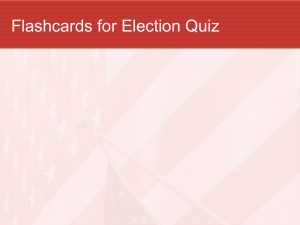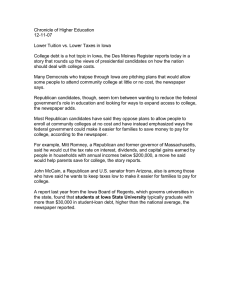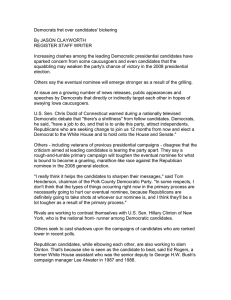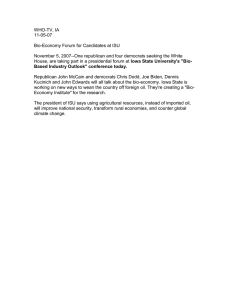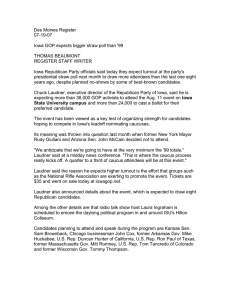Des Moines Register, IA 12-15-07 Behind the tough choices, an invigorating process
advertisement
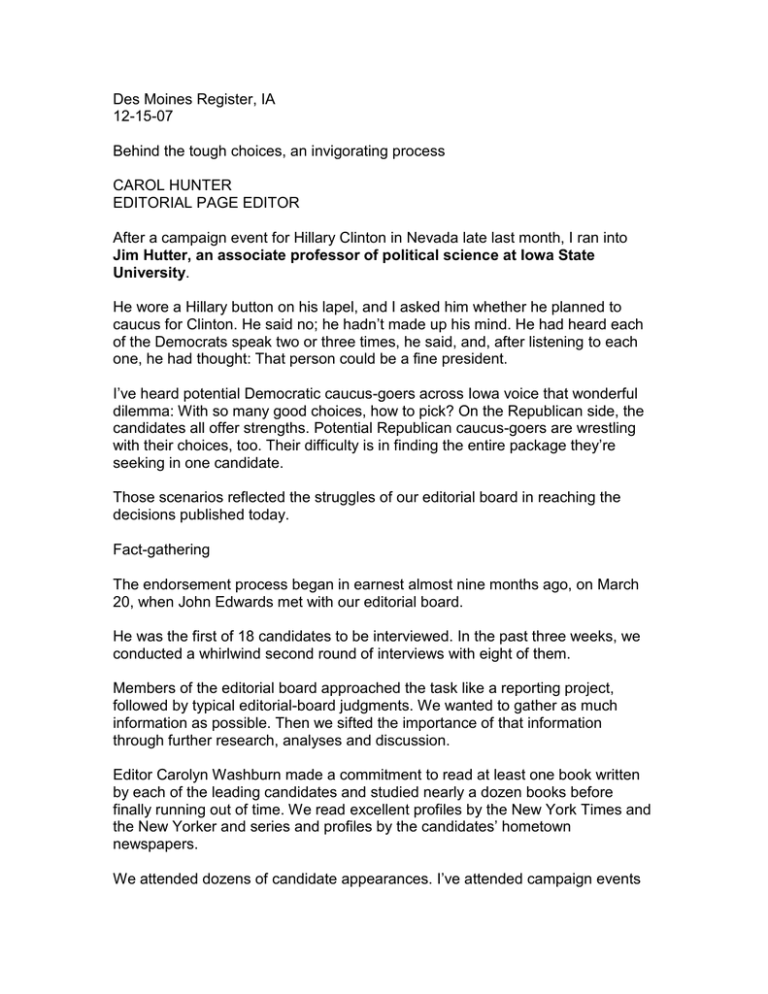
Des Moines Register, IA 12-15-07 Behind the tough choices, an invigorating process CAROL HUNTER EDITORIAL PAGE EDITOR After a campaign event for Hillary Clinton in Nevada late last month, I ran into Jim Hutter, an associate professor of political science at Iowa State University. He wore a Hillary button on his lapel, and I asked him whether he planned to caucus for Clinton. He said no; he hadn’t made up his mind. He had heard each of the Democrats speak two or three times, he said, and, after listening to each one, he had thought: That person could be a fine president. I’ve heard potential Democratic caucus-goers across Iowa voice that wonderful dilemma: With so many good choices, how to pick? On the Republican side, the candidates all offer strengths. Potential Republican caucus-goers are wrestling with their choices, too. Their difficulty is in finding the entire package they’re seeking in one candidate. Those scenarios reflected the struggles of our editorial board in reaching the decisions published today. Fact-gathering The endorsement process began in earnest almost nine months ago, on March 20, when John Edwards met with our editorial board. He was the first of 18 candidates to be interviewed. In the past three weeks, we conducted a whirlwind second round of interviews with eight of them. Members of the editorial board approached the task like a reporting project, followed by typical editorial-board judgments. We wanted to gather as much information as possible. Then we sifted the importance of that information through further research, analyses and discussion. Editor Carolyn Washburn made a commitment to read at least one book written by each of the leading candidates and studied nearly a dozen books before finally running out of time. We read excellent profiles by the New York Times and the New Yorker and series and profiles by the candidates’ hometown newspapers. We attended dozens of candidate appearances. I’ve attended campaign events by 11 candidates and many of the group events — including the Iowa Christian Alliance/Iowans for Tax Relief forum, the straw poll in Ames and the Ronald Reagan Dinner on the Republican side, and the Iowa Farmers Union summit, Jefferson Jackson Dinner and Brown & Black forum, featuring Democrats. Analyzing issues We read position papers and scrutinized candidates’ Web sites. We decided months ago to do in-depth analyses of the candidates’ stands on key issues and roughly divided up the research responsibilities. We published the eight issues packages — on topics ranging from civil liberties to health care to foreign policy — over the past two weeks. That exercise forced us to examine each candidate’s positions and records in detail. In the end, we found that approaches and views varied quite a bit among Republicans on some issues. We didn’t find huge differences in the approaches among Democrats. But we couldn’t have been sure without doing the research. Besides immersing ourselves in policy detail, we sought to learn as much as possible about candidates’ character and personalities, because we know those qualities matter to voters, too, and can factor into performance in office. In the past couple of months, Publisher Laura Hollingsworth, Washburn and I have carved out time to meet with candidates to discuss not only issues but also their political philosophies and management styles. We shared appetizers with Barack Obama, met in a quiet corner of a restaurant with Mitt Romney, and had dinner with Edwards and a brunch with Clinton, among other meetings. We met with some of the candidates’ spouses, too. The pressure’s on The Republican candidates we’ve met with in recent weeks have asked for our endorsement, but the Democrats have been particularly direct in courting it. Because our editorial board’s positions tend to align more closely with those of Democrats than of Republicans, it’s generally accepted that our endorsement has more sway in that party’s races. It’s also thought that our endorsement of Edwards four years ago contributed to his surprise second-place finish. And, of course, the race is so tight that candidates are looking for any edge. Well-known backers of Clinton, including former Secretary of State Madeleine Albright and Gen. Wesley Clark, called to argue her case. Edwards and Obama called frequently in recent weeks to make sure we had full information about their thinking on issues. We pressured ourselves, too, to disregard poll standings. We believe our job as an editorial board is to arrive at the candidate in each party we think would be the best president, whether a person is leading the polls or garnering 1 percent support. It’s not to predict a winner. In our final meetings with Joe Biden, Chris Dodd and Bill Richardson, each appealed to our responsibility to ignore celebrity and the latest poll results. Biden even implied that the future of the lead-off role of the Iowa caucuses could hinge on whether a perceived “second-tier” candidate, aided by our endorsement, could finish in the top three. If candidates with smaller campaign bank accounts can’t break through with retail campaigning here, then why continue giving Iowa its outsized influence? Finally, deciding And so we went back and forth, and back and forth, and back and forth, and eventually reached a decision. We expect more criticism than applause in reaction. Simple math says there are more campaigns and their supporters who will be upset than the two whose candidates received the endorsements. Some had already speculated that we would endorse Clinton because the editor, publisher and I are women. We didn’t begin with Clinton. Like many others, we were skeptical, and, even at the end, not all the women leaned toward Clinton. But she won us over, particularly in the editorial board meetings and debates. And we take our responsibility to Iowa and the nation too seriously to make a decision based on just gender or race or one issue. Regardless, as I look back, I’m filled with gratitude. It’s been a privilege to be part of this process. The candidates who seek the presidency are impressive people. Yes, it takes a big ego to think you should be president of the United States. But it also takes courage and stamina and heart. These are people of accomplishment. They care about their country and want to make it better. I wish all Iowans, and all Americans, could get the chance that we had to learn more about them. Buyer’s remorse? ISU’s Jim Hutter decided last week to caucus for Clinton. He had been attracted to Edwards’ and Obama’s work in lifting up the poor and middle class but eventually became convinced that Clinton’s early history demonstrated concern for those issues, too. Yet it was clear he was still aching over his decision. In our short conversation, he mentioned by name each of the six Democrats who have campaigned so hard in Iowa, and especially credited Biden’s leadership on the Iraq war. “I feel bad that I’m having to turn my back on the others,” he said. “I feel like a traitor to them.” We know what he means.
